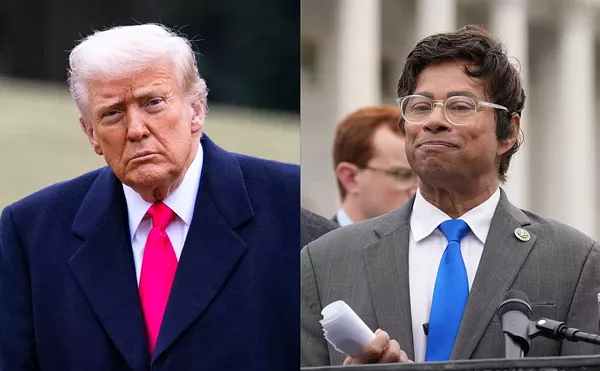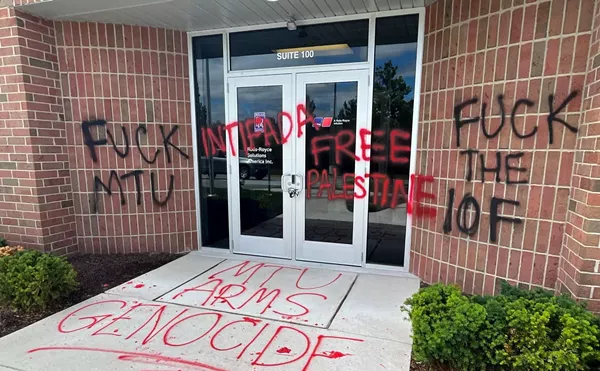Detroit Pistons owner risks tarnishing rep to profit off prison phone call industry

Audio By Carbonatix
[
{
"name": "GPT - Leaderboard - Inline - Content",
"component": "35519556",
"insertPoint": "5th",
"startingPoint": "3",
"requiredCountToDisplay": "3",
"maxInsertions": 100,
"adList": [
{
"adPreset": "LeaderboardInline"
}
]
}
]
This week, after the president railed against NFL players who take a knee during the national anthem and the franchise owners who allow it, the owner of the Detroit Pistons stepped in with a level-headed response.
“America’s most treasured values include equality and diversity,” said team owner Tom Gores. “We support [our players’] right to raise awareness in a manner they believe is both thoughtful and impactful. We hope that any response to it will be equally thoughtful.”
Gores didn’t have to weigh in. Donald Trump had taken aim at players and owners in a different league, and though he did also disinvite the NBA’s Golden State Warriors to the White House, fewer than 10 NBA team owners remarked. Gores also went further than others, extolling the principle of equality.
The statement, in some ways, is not surprising. Gores, an investment billionaire who was raised near Flint, has acquired the title of “civic leader” since buying the Pistons in 2011. Early on, he billed the purchase as more than a money-making venture, suggesting that turning the team around could help attract more people to Detroit because “this city needs that.” Gores is also known for his philanthropy in the wake of the Flint water crisis. He's put $10 million toward helping the city recover and has attracted tens of millions more through partnerships with other investors.
— Tom Gores (@TomGores) September 25, 2017
Of course, Gores’ incredible generosity is only made possible by his massive wealth. According to Forbes, the man with the wind-swept 1980s-John Travolta hair is worth $3.7 billion and his firm, Platinum Equity, was the 22nd-largest private company in the U.S in 2014.
Platinum boasts a diverse portfolio, with about three dozen companies stretching across a variety of industries. But now Gores' firm is seeking federal approval for a a controversial acquisition: Platinum wants to get in on the highly-profitable prison phone call business by purchasing the call company Securus.
“It’s a moralistic problem,” says prisoner rights advocate and Detroit resident Ronald Simpson-Bey. “He’s trying to profit off the sorrow and exploitation of people who can least afford it.”
According to Crain’s Business, Platinum specializes in buying cheap companies, fixing them, and selling them for a profit. But Gores seems to have deviated from that formula in his plan to purchase Securus, offering to pay a reported $1.6 billion for the prison services company — more than twice what it sold for the last time it changed hands in 2013, according to Bloomberg News.
There’s a reason Gores may be willing to pay such a hefty sum for Securus: Obama-era FCC regulations that capped the rates of most prison phone calls were recently reversed, allowing the companies to revert to their old practices and charge rates of up to $1.50 a minute.
“I remember calls costing $15-$20 for 15 minutes,” said Simpson-Bey, who was incarcerated in Michigan prisons for 27 years until 2012. (According to Bloomberg News, Securus specifically charges up to $22.56 for a 15-minute call from the Michigan prisons it contracts with).
The industry benefits from its literally captive clientele and the fact that there are few players in the game. Securus controls has about 20 percent of the prison call market share, while the leading company, Global Tel Link, controls about 50 percent of the market. And each company has a monopoly with the prison it serves — meaning you have no choice but to use that company to connect by phone with the inmate you’re trying to reach. According to The New York Times, the prison phone system was a $1.2 billion-a-year industry just before the Obama-era regulations took effect in 2015.
The effort to reign in the cost of prison calls began in 2000, with a class action lawsuit filed on behalf of a Washington, D.C. grandmother who was paying more than $100 a month to reach her grandson across district lines. For families of inmates, such fees can be particularly burdensome, as, according to the Prison Policy Initiative, the median income for people who wind up incarcerated is about $19,000 a year.
In 2014 and 2015, the FCC granted prisoner families and friends burdened by the exorbitant costs a reprieve by capping the rates of in-state and out-of-state calls. Simpson-Bey, who was by then living back home in Detroit, recalls spending just $3 or $4 to talk to an incarcerated family member for fifteen minutes.
But the lower rates were short-lived. This February, Ajit Pai, the Trump-appointed FCC chairman, said he would no longer defend the FCC’s move to cap the rates, which had prompted lawsuits from the prison industry immediately after they were approved. In June, a federal appeals court ruled the FCC had overstepped in adjusting the rates for in-state calls, which make up about 80 percent of all prison phone calls.
“The gloves are off now,” says Brian Dolinar with the Illinois Campaign for Prison Phone Justice. “They can pretty much charge whatever they want; they're literally holding people hostage.”
Gores stepped in after Trump’s FCC signaled a change in course, and just before the rate caps were rolled back by the court. Platinum Equity filed for FCC approval to buy Securus on May 11.
A spokesman for Platinum Equity declined to comment on the pending sale, but suggested Metro Times reach out to Securus about its business practices. Securus also declined to comment.
While Securus would not make the case for itself, the inflated cost of calls does not translate to pure profit for it and other prison call phone companies. The companies have to pay concession fees to prisons and local governments to secure contracts, causing “inmates and their friends and families to subsidize everything from inmate welfare to salaries and benefits, states’ general revenue funds,” according to the FCC. The New York Times reports that Securus in 2015 told regulators it paid $1.3 billion in concession fees over the previous decade.
While it'll be extremely difficult to reform the industry following the June appeals court ruling, Dolinar says if efforts to lower the call rates do not prevail, the general public will suffer in the long run.
“It's been shown, even prison authorities agree, that regular communication between a person incarcerated and their families helps them to transition back into society when they are released,” he said.
Democrat Senator Tammy Duckworth of Illinois has introduced a bill in the Republican-controlled legislature that seeks to cap the rates.
In the meantime, Gores’ application to buy Securus is awaiting FCC approval. The Prison Policy Initiative has petitioned the agency to block it. According to Bloomberg News, there’s no deadline by which the FCC has to act.





